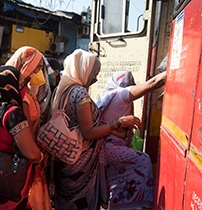Abstract
Using an original household survey conducted in Hyderabad and Mumbai that identifies intracity spatial coordinates of residents, we present a socio-spatial analysis of gender and paid work. We show that the ease of movement through the city, allocation of care work related considerations and educational attainment are all crucial to understanding the labor force participation patterns of urban women. A gender lens identifies key facets of access and mobility characterizing urbanization in developing countries. Spatial heterogeneity of residence has very different outcomes for the labor force participation of women and men.



